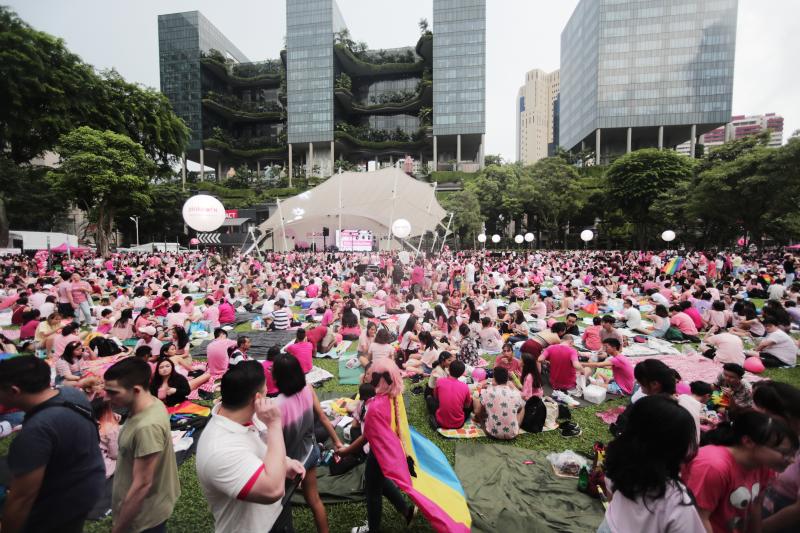Majority of Singaporeans uncomfortable with religious leaders speaking up on LGBT issues: IPS study
Sign up now: Get ST's newsletters delivered to your inbox

A photo taken on June 29 shows the Pink Dot SG event at Hong Lim Park. Respondents to the IPS study identified religion and LGBT issues as the fault lines most likely to lead to the polarisation of society.
ST PHOTO: KELVIN CHNG
SINGAPORE - Religious people or leaders speaking up strongly on lesbian, gay, bisexual and transgender (LGBT) issues could cause significant discomfort among Singaporeans.
Some six in 10 respondents to a study of public opinion on fault lines in Singapore said they would be uncomfortable with this scenario.
The respondents also identified religion and LGBT issues as the fault lines most likely to lead to the polarisation of society.
These findings, which were released by the Institute of Policy Studies on Tuesday (Oct 29), attest to the importance of the Government's policy of separating religion and politics, said the study's authors.
It also highlights the need for consultative and inclusive policymaking to mitigate polarisation, they added.
The authors were IPS senior research fellow Mathew Mathews, research associate Melvin Tay and research assisant Shanthini Selvarajan.
Between 2013 and 2018, there have been "steep drops" in opposition towards LGBT issues, the study said. But divisions along this fault line are likely to deepen, given the role that other social divides such as religion, age and education level play in shaping attitudes towards LGBT issues.
Christian respondents were the most likely to be amenable to religious leaders being vocal about LGBT issues. Slightly over half of them said they would be comfortable with it, while the majority of those professing other religions or no religion - between 55 and 71 per cent - said they would feel uncomfortable.
Older and less educated respondents were also more likely to indicate discomfort with religious leaders engaging in public discourse on LGBT issues.
This could be due to younger and more educated respondents being more inclined towards free speech, the study said.
On the potential consequences of managing LGBT issues poorly, younger and more educated respondents were more likely to feel this could result in polarisation, anger against particular communities and falling levels of trust in the Government.
Half of those aged 18 to 25, the youngest cohort surveyed, said polarisation and anger were likely consequences, as did more than half of respondents who held a bachelor's degree and above.
Just over a third of those aged above 65, and those with secondary education and below, felt the same way.
About 27 per cent of the youngest respondents and 28 per cent of degree holders felt that erosion of trust in the Government was likely compared to less than 18 per cent for both the oldest and least educated respondents.
This could indicate that LGBT issues were seen as more crucial among younger and more educated respondents, who tended to be more accepting of LGBT rights, the study said.
Christian respondents, who were more likely to hold conservative views on gender and sexuality, also indicated the highest levels of concern over all of the potential consequences compared to those of other religious affiliations.
This illustrates the significance of LGBT issues to Christians in relation to their faith, the study said.
The divisiveness of LGBT issues also came through in respondents' desired levels of state involvement and public discussion.
Younger respondents and those who said they held more liberal views on sexuality were the most likely to want greater government involvement and more public discussion of LGBT issues.
"The potential reasons for them wanting more government involvement could be in the form of ensuring equal rights for LGBT people or repealing Section 377A," said Dr Mathews.
Section 377A of the Penal Code criminalises consensual sex between men, an offence which carries up to a two-year jail term.
Older respondents and those who said they held neutral or more conservative views on sexuality were more likely to feel the current levels of government involvement and public discussion are sufficient.
Christians (46 per cent) and Muslims (about 44 per cent) were also more likely to support greater government involvement - but for different reasons.
Adherents of monotheistic faiths are less likely to support LGBT rights, and may want state involvement in the form of retaining Section 377A or curtailing the rise of LGBT discourse and events such as the annual pro-LGBT Pink Dot rally, the study said.
"They may want government involvement to deal with what might be seen as intrusions on the status quo," said Dr Mathews.
But a sizeable proportion of Muslims also indicated that they wanted less government involvement - 21 per cent of Muslims fell into this category, compared to just 12.6 per cent of Christians and 18.1 per cent of respondents overall.
This implies that within the Muslim community, there are significant differences in views on whether LGBT issues should fall within the ambit of governance and policy, the study said.


